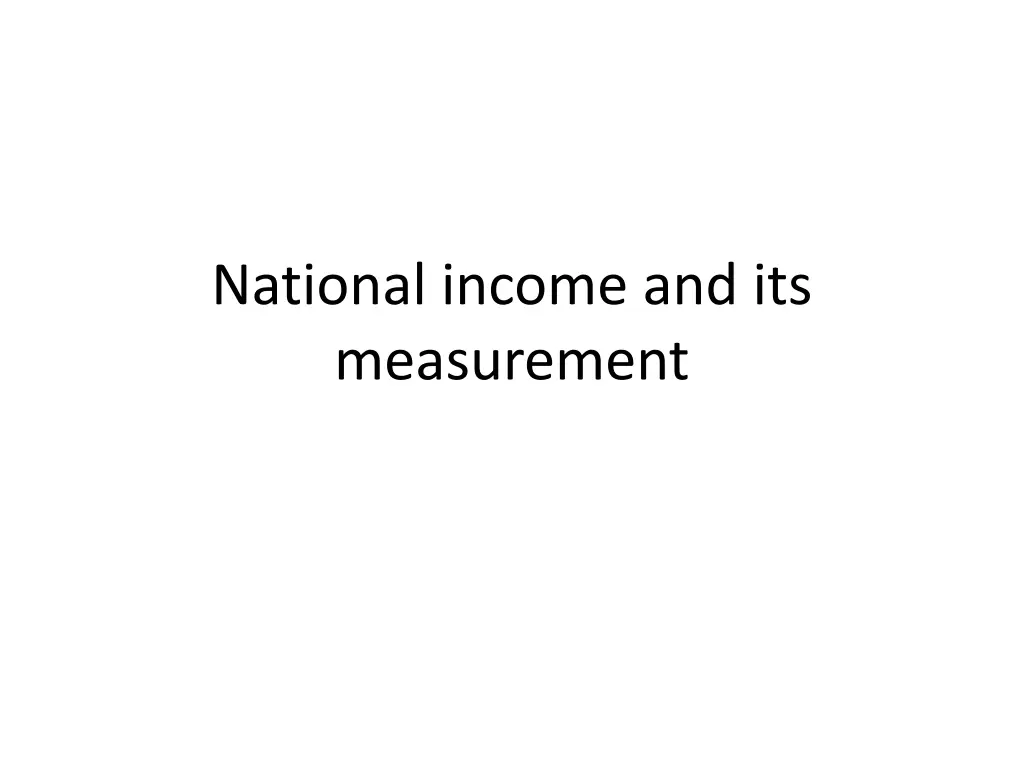
Understanding National Income and Economic Measurement
Explore the concepts of national income, domestic income, and Gross National Product (GNP). Learn about their importance, limitations, and calculation methods, along with insights into economic performance assessment, standard of living, and forecasting based on domestic income data.
Download Presentation

Please find below an Image/Link to download the presentation.
The content on the website is provided AS IS for your information and personal use only. It may not be sold, licensed, or shared on other websites without obtaining consent from the author. If you encounter any issues during the download, it is possible that the publisher has removed the file from their server.
You are allowed to download the files provided on this website for personal or commercial use, subject to the condition that they are used lawfully. All files are the property of their respective owners.
The content on the website is provided AS IS for your information and personal use only. It may not be sold, licensed, or shared on other websites without obtaining consent from the author.
E N D
Presentation Transcript
National income and its measurement
Define domestic income. Domestic Income is the total income earned by all individuals and businesses within the boundaries of a particular country during a year.
Importance of the measurement of Domestic Income 1. Economic performance assessment: It allows policymakers and economist to gauge whether an economy is expanding, contracting or stagnant. 2. Standard of living: GDP per capita is often used as a measure of the standard of living in a country. 3. Planning and forecasting: Economist and financial analysts use domestic income data to forecast future economic trends.
Limitations of Domestic Income Narrow concept: Domestic income only includes income generated from productive activities within a specific country s borders not from global sources. Excludes informal economy: It doesn't fully capture economic activities in the informal sector, such as household work, informal jobs or services provided within communities, the contribution of which may be significant in less developed countries.
Problem of data collection: Computing domestic income involves complex measurement methodologies. Inaccurate or incomplete data can lead to misleading conclusions. Unequal distribution: Domestic income does not reflect income distribution within a country which means it is unable to say whether benefits of higher economic growth percolate to the lower section of the society.
Gross National Product (GNP) GNP is the monetary value of all final goods and services produced by the residents of a country in a year. How to calculate GNP?j to calculate GNP? GNP is calculated consumption expenditures, expenditures, private domestic investments, net exports and all income earned by residents in foreign countries, minus the income earned by foreign residents within the domestic economy. by adding personal government
The formula for calculating GNP is as follows- Y= C + I + G + X + Z Where, C= Consumption Expenditure I= Investment G= Government Expenditure X= Net Exports Z= Net Income
What is Net Domestic Product? It is the value of GDP after deducting depreciation of plants and machinery from GDP. NDP= GDP- Depreciation
Define NDP at factor cost NDP at factor cost is the total income earned by factors of production within a country s borders normally during a year. It considers the value added by each factor input, such as labour, capital and land in the production process. What is NNP(Net National Product)? NNP= GNP-Depreciation
Personal Income Personal Income is the total earnings or income received by an individual or household from all sources before taxes and other deductions. It includes various types of income like regular wages, bonuses, overtime pay, rental income, interest from savings accounts, bonds, pensions, money received from the government unemployment benefits payments. in the or form disability of
It is estimated as follows: PI= NI+Transfer payments-social security contributions- corporate tax-undistributed profits.
Importance of personal income An indicator of economic trends: PI is an important economic indicator used to assess the overall performance of an economy. Throw lights on income distributions: PI data helps us to see how money is divided among people in a society. Consumer behaviour: PI directly influences consumer spending patterns. When people earn more, they tend to spend more on goods and services and that boosts the economy.
Tax policy: Government look at personal income data to decide on tax rules. Welfare programs: PI information helps figure out who should get help from government welfare programs. This makes sure that people who really need support get it.
Limitations of PI Excludes non-market activities: It does not count activities like unpaid household work and volunteer work, even though these works significantly contribute to economic value and welfare. Ignores regional differences: PI data may not reflect regional disparities in income. Some places might be really expensive to live in or have big differences in how much money people have, which is not adequately represented by personal income data.
